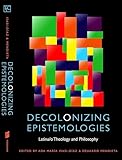Decolonizing Epistemologies : Latina/o Theology and Philosophy / ed. by Eduardo Mendieta, Ada María Isasi-Díaz.
Material type: TextSeries: Transdisciplinary Theological ColloquiaPublisher: New York, NY : Fordham University Press, [2022]Copyright date: ©2012Description: 1 online resource (320 p.)Content type:
TextSeries: Transdisciplinary Theological ColloquiaPublisher: New York, NY : Fordham University Press, [2022]Copyright date: ©2012Description: 1 online resource (320 p.)Content type: - 9780823241361
- 9780823291366
- online - DeGruyter
| Item type | Current library | Call number | URL | Status | Notes | Barcode | |
|---|---|---|---|---|---|---|---|
 eBook
eBook
|
Biblioteca "Angelicum" Pont. Univ. S.Tommaso d'Aquino Nuvola online | online - DeGruyter (Browse shelf(Opens below)) | Online access | Not for loan (Accesso limitato) | Accesso per gli utenti autorizzati / Access for authorized users | (dgr)9780823291366 |
Frontmatter -- CONTENTS -- Acknowledgments -- Introduction: Freeing Subjugated Knowledge -- KNOWING REALITY -- Decolonizing Western Epistemology / Building Decolonial Epistemologies -- Mujerista Discourse: A Platform for Latinas’ Subjugated Knowledge -- Methodological Notes toward a Decolonial Feminism -- An(other) Invitation to Epistemological Humility: Notes toward a Self-Critical Approach to Counter-Knowledges -- LATINA/O LOCUS HISTORICUS -- Anti-Latino Racism -- The Act of Remembering: The Reconstruction of U.S. Latina/o Identities by U.S. Latina/o Muslims -- If It Is Not Catholic, Is It Popular Catholicism? Evil Eye, Espiritismo, and Santeria: Latina/o Religion within Latina/o Theology -- ‘‘Racism is not intellectual’’: Interracial Friendship, Multicultural Literature, and Decolonizing Epistemologies -- MAPPING LATINA/O FUTURES -- Epistemology, Ethics, and the Time/Space of Decolonization: Perspectives from the Caribbean and the Latina/o Americas -- Thinking Bodies: The Spirit of a Latina Incarnational Imagination -- Decolonizing Religion: Pragmatism and Latina/o Religious Experience -- The Ethics of (Not) Knowing: Take Care of Ethics and Knowledge Will Come of Its Own Accord -- Notes -- List of Contributors -- Index
restricted access online access with authorization star
http://purl.org/coar/access_right/c_16ec
Decolonizing Epistemologies builds upon the contributions of liberation and postcolonial theories in both philosophy and theology. Gathering the work of three generations of Latina/o theologians and philosophers who have taken up the task of transforming their respective disciplines, it seeks to facilitate the emergence of new knowledge by reflecting on the Latina/o reality in the United States as an epistemic locus: a place from which to start as well as the source of what is known and how it is known. The task of elaborating a liberation and decolonial epistemology emerges from the questions and concerns of Latina/os as a minoritized and marginalized group. Refusing to be rendered invisible by the dominant discourse, the contributors to this volume show the unexpected and original ways in which U.S. Latina/o social and historical loci are generative places for the creation of new matrices of knowledge. Because the Latina/o reality is intrinsically connected with that of other oppressed groups, the volume articulates a new point of departure for the self-understanding not only of Latina/os but also possibly for other marginalized and oppressed groups, and for all those seeking to engage in the move beyond coloniality as it is present in this age of globalization.
Mode of access: Internet via World Wide Web.
In English.
Description based on online resource; title from PDF title page (publisher's Web site, viewed 03. Jan 2023)


